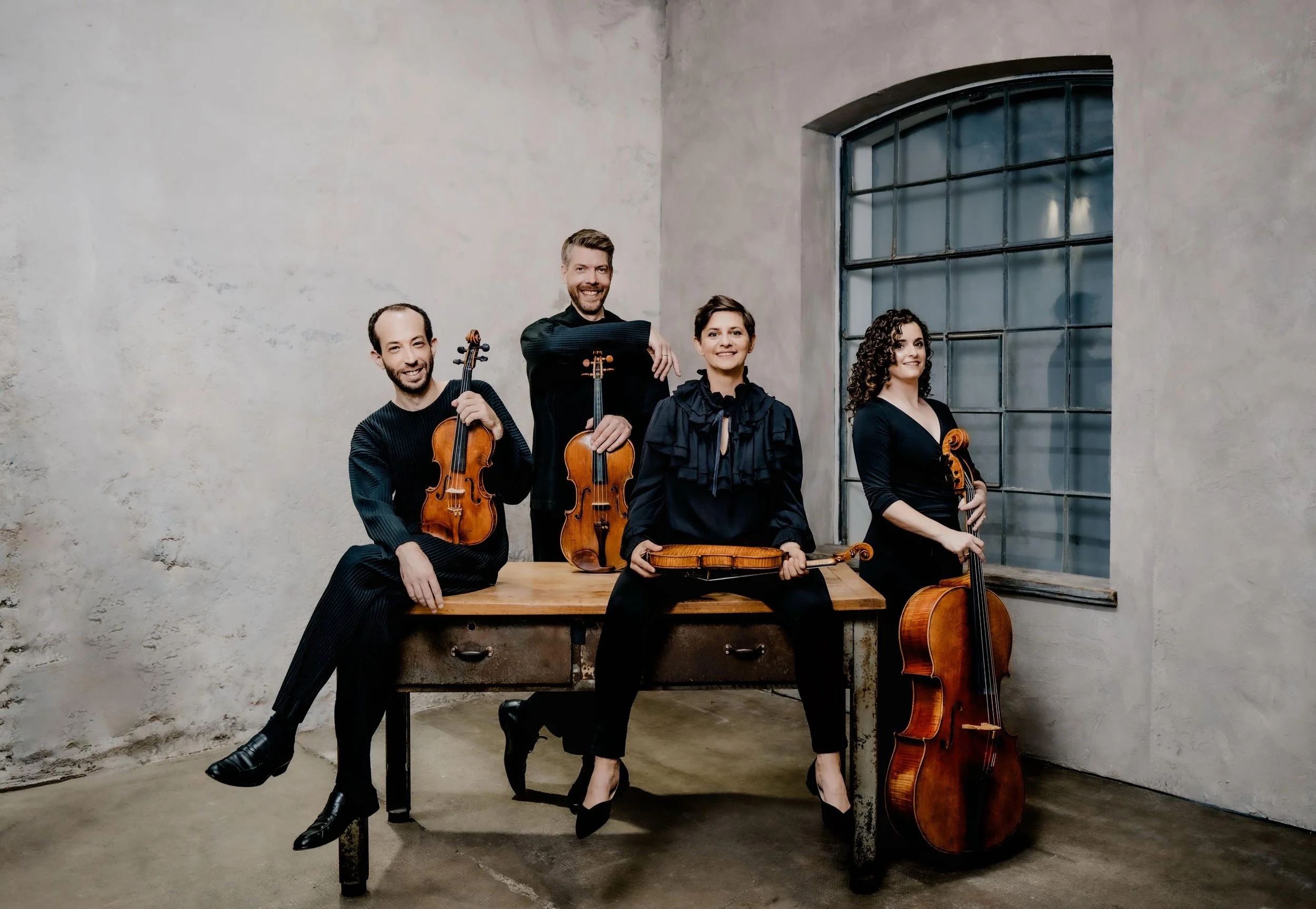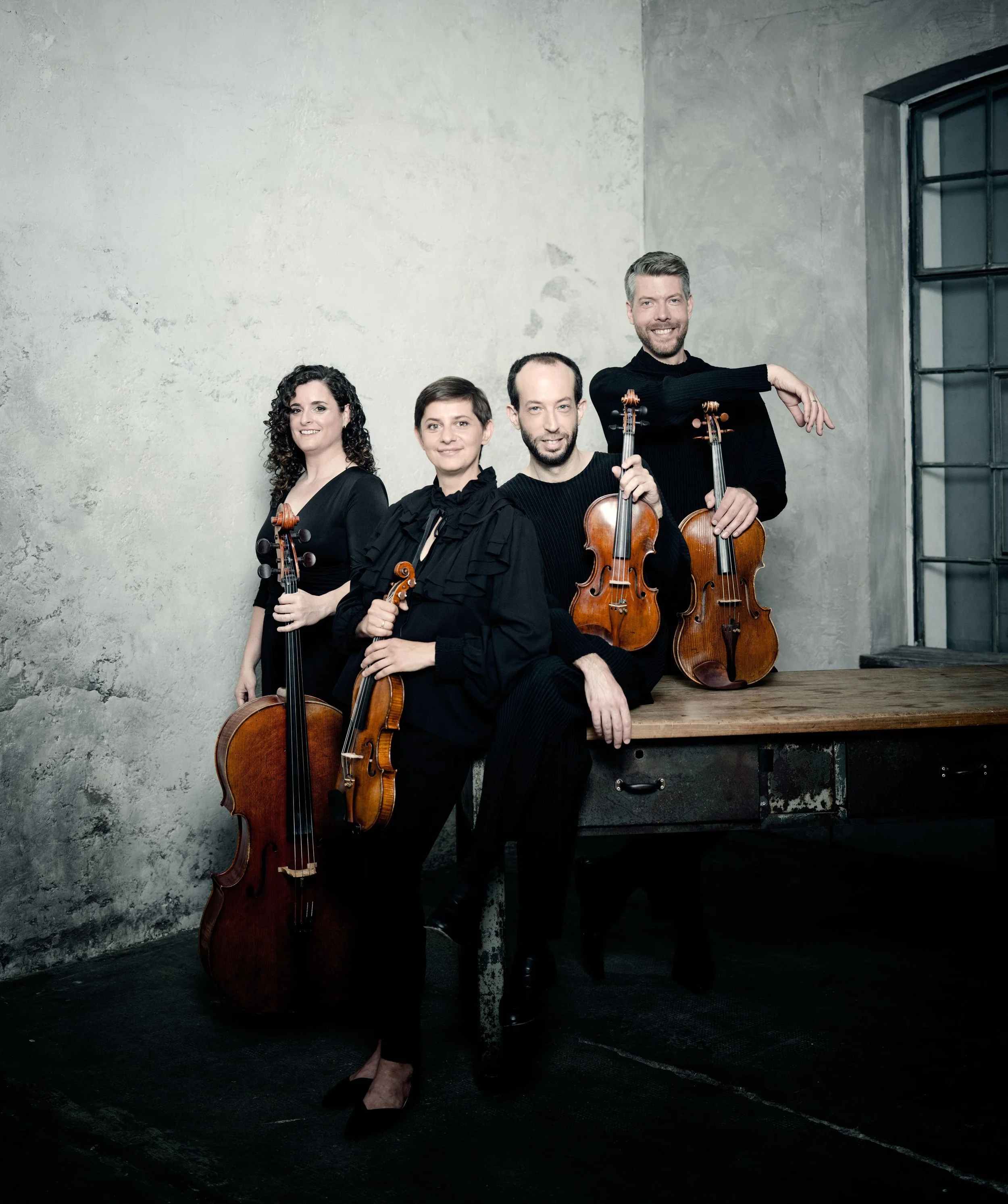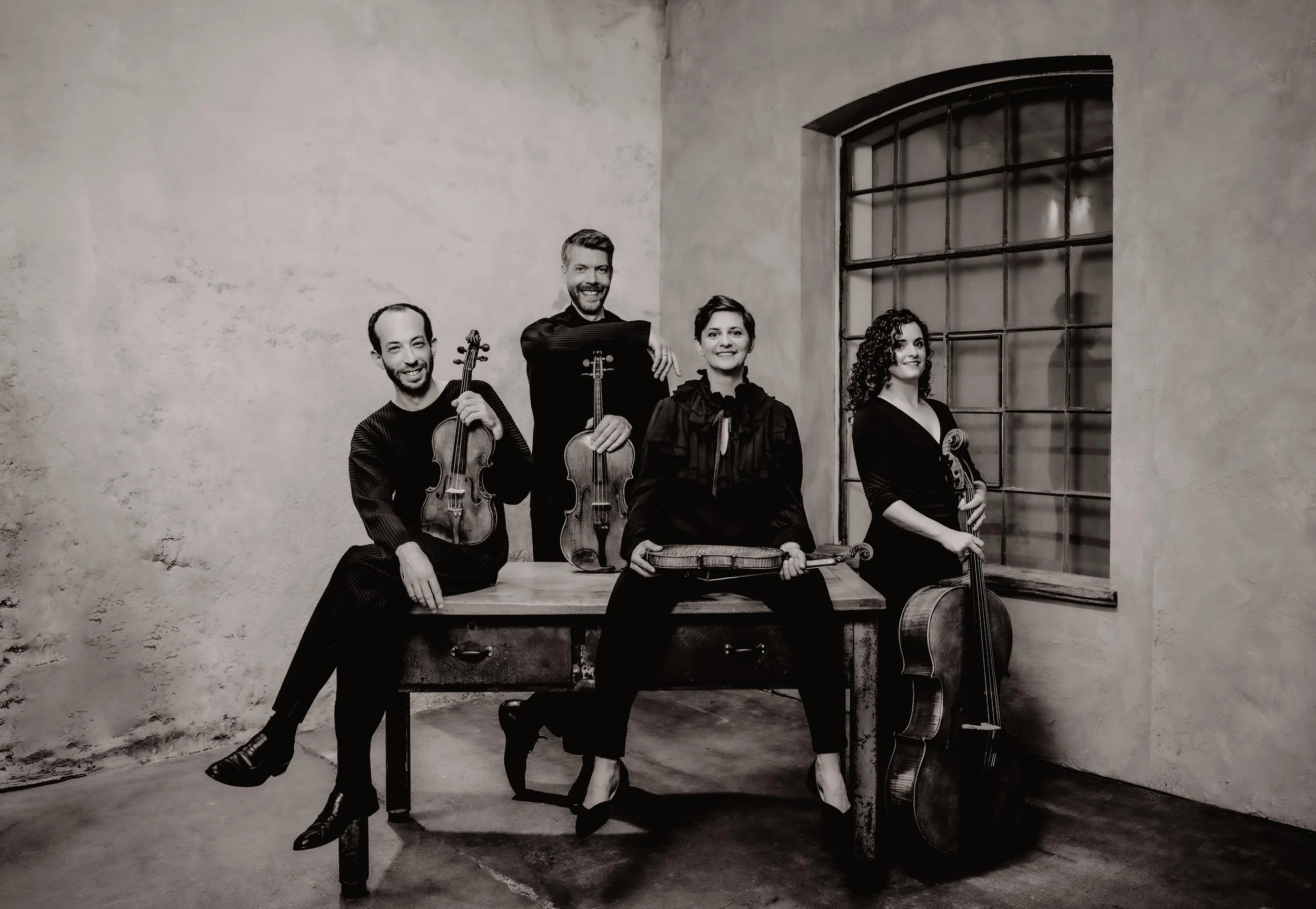
Ariel Quartet
Gershon Gerchikov, violin | Alexandra Kazovsky, violin | Jan Grüning, viola | Amit Even-Tov, cello
“...a gripping and often very subtle reading, setting ear-melting tenderness against seething passion with a deft and precise touch.”
-
A happy accident kickstarted our group in 1998, when we were 13 years old, attending a school for music and dance. Amidst stretching ballerinas and improvising jazz pianists, we were simply assigned to play together. Our teacher spoon-fed us repertoire just beyond our ability, knowing we were about to discover the addictive magic of playing string quartets. We spent our teenage years rehearsing in the school attic, immersing ourselves in the richness of the string quartet repertoire while learning to navigate both the music and our evolving relationships. Balancing a budding concert career with high school life was both challenging and rewarding, often providing excellent excuses to skip class. This lifestyle juxtaposition was on full display when we showed up to the prize-announcement ceremony of the 2003 Franz Schubert and Modern Music Competition in Graz, wearing pajamas, ready to cheer on the prize winners - only to discover we were to be awarded the first prize ourselves…
Today, 27 years in and with three founding members still on board, our mission is to breathe life into the bread and butter of the string quartet repertoire while shining a spotlight on the compelling music of our time. This commitment led us to perform the complete Beethoven cycle before any of us turned 30, while also expanding the repertoire through commissions by established composers such as Mohammed Fairouz, Matan Porat or John Harbison. The joy of sharing the music we love with audiences in the most direct way remains the essence of our experience as musicians - it is the “glue” that has kept us together for more than half our lives. We were fortunate to have had inspiring mentors, including the members of the Cleveland Quartet, Walter Levin of the LaSalle Quartet, and the Amadeus Quartet. Over the past 12 years, succeeding the LaSalle Quartet as Quartet-in-Residence at the Cincinnati College-Conservatory of Music (CCM) has become a deeply fulfilling part of our lives. Sharing the experience we’ve gained onstage, we maintain individual studios, mentor young ensembles, and are particularly excited about the recent revival of the renowned graduate string quartet residency program.
Our unusual journey has been fundamental in shaping who we are. Beyond the demands of our shared professional path, we have walked together as friends who have truly become family. From late-night debates about tempo and sight-reading marathons to raising our children alongside one another while balancing an international concert career, we have shared every stage of life. This closeness has created a deep and unique bond that continues to shape our identity, both on stage and beyond.
-
The Ariel Quartet thrills audiences with its virtuosity, probing musical insight, and impassioned, fiery performances.
-
In addition to the Cleveland Quartet Award, the Ariel Quartet has won numerous international prizes in addition to the Cleveland Quartet Award: Grand Prize at the 2006 Fischoff National Chamber Music Competition and the Székely Prize for the performance of Bartók’s String Quartet No. 4, and Third Prize at the Banff International String Quartet Competition.
-
The Ariel Quartet serves as the Faculty Quartet-in-Residence at the University of Cincinnati’s College-Conservatory of Music, where they direct the chamber music program and present a concert series in addition to maintaining a busy touring schedule in the United States and abroad.
Distinguished by its virtuosity, probing musical insight, and impassioned, fiery performances, the Ariel Quartet has garnered critical praise worldwide for more than a quarter of a century. Formed when the members were just teenagers, the Ariel was recently named recipient of the prestigious Cleveland Quartet Award granted by Chamber Music America. In addition to maintaining a busy international touring schedule, the Quartet serves as the Faculty Quartet-in-Residence at the University of Cincinnati’s College-Conservatory of Music.
The Ariel has performed at leading venues across the globe, including Carnegie Hall, the Lincoln Center, the Kennedy Center and the Kaisersaal in Frankfurt. Their recording of Brahms and Bartók for Avie Records has been critically acclaimed, and they regularly collaborate with artists such as Inon Barnatan, the Mark Morris Dance Group, and cellist Alisa Weilerstein.
In the 2025-26 season, the Ariel Quartet continues its tradition of vibrant chamber music-making with performances presented by some of the nation’s leading cultural organizations. Their engagements include appearances with the Bender JCC-GW, Chamber Music Society of Central Kentucky, Chamber Music in Oklahoma, the Jay and Susie Gogue Performing Arts Center at Auburn University, the Perlman Music Program/Suncoast, and The Crypt Sessions.
-
Renowned for their interpretations of Beethoven’s quartets, the Ariel Quartet has performed the complete Beethoven cycle numerous times throughout the United States and Europe. They regularly collaborate with eminent musicians, including pianists Jeremy Denk and Orion Weiss, cellists Paul Watkins and Claudio Bohorquez and in 2020, the Quartet gave the U.S. premiere of the Quintet for Piano and Strings by Daniil Trifonov with the composer as pianist. They have also served as Quartet-in-Residence for leading institutions such as the Ravinia Festival’s Steans Music Institute, the Yellow Barn Music Festival, and the Perlman Music Program.
The Ariel was mentored extensively by acclaimed string quartet giants Walter Levin and Paul Katz, and they have won numerous international prizes: 2003 First Prize at the Franz Schubert Competition in Graz/Austria, the Grand Prize at the 2006 Fischoff National Chamber Music Competition, the Székely Prize for the performance of Bartók’s String Quartet No. 4, and Third Prize at the Banff International String Quartet Competition. The American Record Guide described the group as “a consummate ensemble gifted with utter musicality and remarkable interpretive power” and noted, in particular, their playing of Beethoven’s monumental Quartet in A minor, Op. 132, as “the pinnacle of the competition.”
The Ariel Quartet has received significant support from the American-Israel Cultural Foundation, Dov and Rachel Gottesman, and the Legacy Heritage Fund, and were awarded a grant from the A.N. and Pearl G. Barnett Family Foundation.
Beyond their musical pursuits, the members of the Ariel Quartet bring a rich diversity of passions to their lives. Gershon is a programming enthusiast and espresso aficionado, known for his expertise in spreadsheets and his love of Satsivi and Bourbon. Sasha, a supermom of two boys, channels her creativity through arts and crafts and finds joy in hiking and the outdoors. Jan, a private chef-level culinary artist, is a home barista and father of three girls, and Amit, a master baker and pastry expert, delights in perfecting her cappuccino craft while being a supermom of the same three girls.
For more information visit www.arielquartet.com
July 2025 – Please do not edit without permission.
Videos
Programs & Repertoire
-
PROGRAM I – WUNDERKIND
Franz Schubert: String Quartet No. 8 in B-flat major, Op. 168, D. 112
Benjamin Britten: Quartettino
*****
Felix Mendelssohn: String Quartet in A minor, Op. 13Wunderkind explores the remarkable artistry achieved at a young age by three giants of the music world, featuring breathtaking works composed by Franz Schubert, Benjamin Britten, and Felix Mendelssohn, all written during their teenage years.
PROGRAM II – VIENNESE SCHOOL MIXTAPE
Joseph Haydn: String Quartet in E-flat major, Op. 33, No. 2, “The Joke”
Alban Berg: String Quartet, Op. 3
*****
Ludwig van Beethoven: String Quartet in B-flat major, Op. 130 (with Op. 133 Grosse Fuge ending)PROGRAM III – PRAYER
Lera Auerbach: Primera Luz
Matan Porat: Four Ladino Songs*
commissioned by the Cincinnati College-Conservatory of Music for the Ariel Quartet
*****
Ludwig van Beethoven: String Quartet in A minor, Op. 132*Alternatively available is a collaboration with Clarinetist David Krakauer for Osvaldo Golijov’s The Dreams and Prayers of Isaac the Blind
PROJECTS
PROJECT I - AMERICAN DREAM
Unannounced Half: Music and spoken word
*****
Antonín Dvořák: Quartet in F major, Op. 96, “American”This program is designed to amplify the voices of composers of diverse backgrounds who had one thing in common: the pursuit of their unique version of an American Dream. The first half of this program is an unannounced collection of pieces intertwined with inspirational quotes to guide the listener through this journey, followed by one of the most iconic pieces written for the genre: Dvořák’s “American” quartet.
The identity of the featured composers will be revealed to the audience during intermission.
PROJECT II - BENJAMIN BRITTEN
Benjamin Britten: String Quartet No. 1 in D major, Op. 25 (1941)
Benjamin Britten: String Quartet No. 2 in C major, Op. 36 (1945)
*****
Benjamin Britten: String Quartet No. 3 in G major, Op. 94 (1975)Benjamin Britten, undoubtedly one of the most unique and influential composers of the 20th century, passed away in 1976, and we regard his string quartet output as unbelievably powerful and communicative. Join us in celebrating this master’s legacy through the rarely offered lens of his three major works for String Quartet.
-
PROGRAM I
Felix Mendelssohn: String Quartet in A minor, Op. 13, No. 2
Caroline Shaw: “Blueprint”
*****
Ludwig van Beethoven: String Quartet in A minor, Op. 132, No. 15PROGRAM II
Joseph Haydn: String Quartet in C, Op. 33, No. 3 ‘The Bird’
Béla Bartók: String Quartet No. 3
*****
Johannes Brahms: String Quartet in C minor, Op. 51, No. 1PROGRAM III
Franz Schubert: Rosamunde
Lera Auerbach: String Quartet No. 10 ‘Frozen Dreams’
*****
Ludwig van Beethoven: String Quartet in B-flat, Op. 130; Grosse Fuge, Op. 133ARIEL QUARTET + ORION WEISS, PIANO
Joseph Haydn: String Quartet in C, Op. 33, No. 3 ‘The Bird’ OR Ernő Dohnányi: Piano Quintet in E-flat minor, Op. 26, No. 2
Johannes Brahms: String Quartet in C minor, Op. 51, No. 1
*****
Ernő Dohnányi: Piano Quintet in C minor, Op. 1, No. 1 -
PROGRAM I - VIENNA: A SCHUBERT CELEBRATION
Haydn: String Quartet in B-flat Major, Op. 50, No. 1
Caroline Shaw: “Blueprint”
*****
Schubert: String Quartet in G Major, D.887In honor of the upcoming Schubert year 2028, featuring Schubert’s most iconic String Quartet side by side with the Father of the String Quartet and Caroline Shaw’s work, reflecting on Beethoven’s String Quartet No.6, Op.18, No. 6.
PROGRAM II - LIFE CYCLE OF THE STRING QUARTET
Beethoven: String Quartet No. 3 in D Major, Op. 18, No. 3
Lera Auerbach: String Quartet No. 11 (Commissioned for the Ariel Quartet in 2026 by the Dortmund Konzerthaus)
*****
Brahms: String Quartet No. 2 in A Minor, Op. 51Spanning the arch from the first Viennese School, via the Romantic period, all the way to today, with an exciting new commission from one of today’s most prolific female composers.
PROGRAM III - PINTSCHER COMMISSION
Program TBATo celebrate their 30th season, legendary German composer Matthias Pintscher will write the Ariel Quartet his first quartet in 15 years: ‘Makrom/Place’. This exciting new work will revolve around the idea of the meaning of space/place/home.
ARIEL QUARTET + ORION WEISS, PIANO - DOHNANYI ANNIVERSARY*
Ernő Dohnányi: Piano Quintet No. 1 in C minor, Op. 1 -OR- Ernő Dohnányi: Piano Quintet in E-flat minor, Op. 26, No. 2
*****
Brahms: String Quartet No. 2 in A Minor, Op. 51
Haydn: String Quartet in B-flat Major, Op. 50, No. 1*Program order to be confirmed based on Quintet selection







